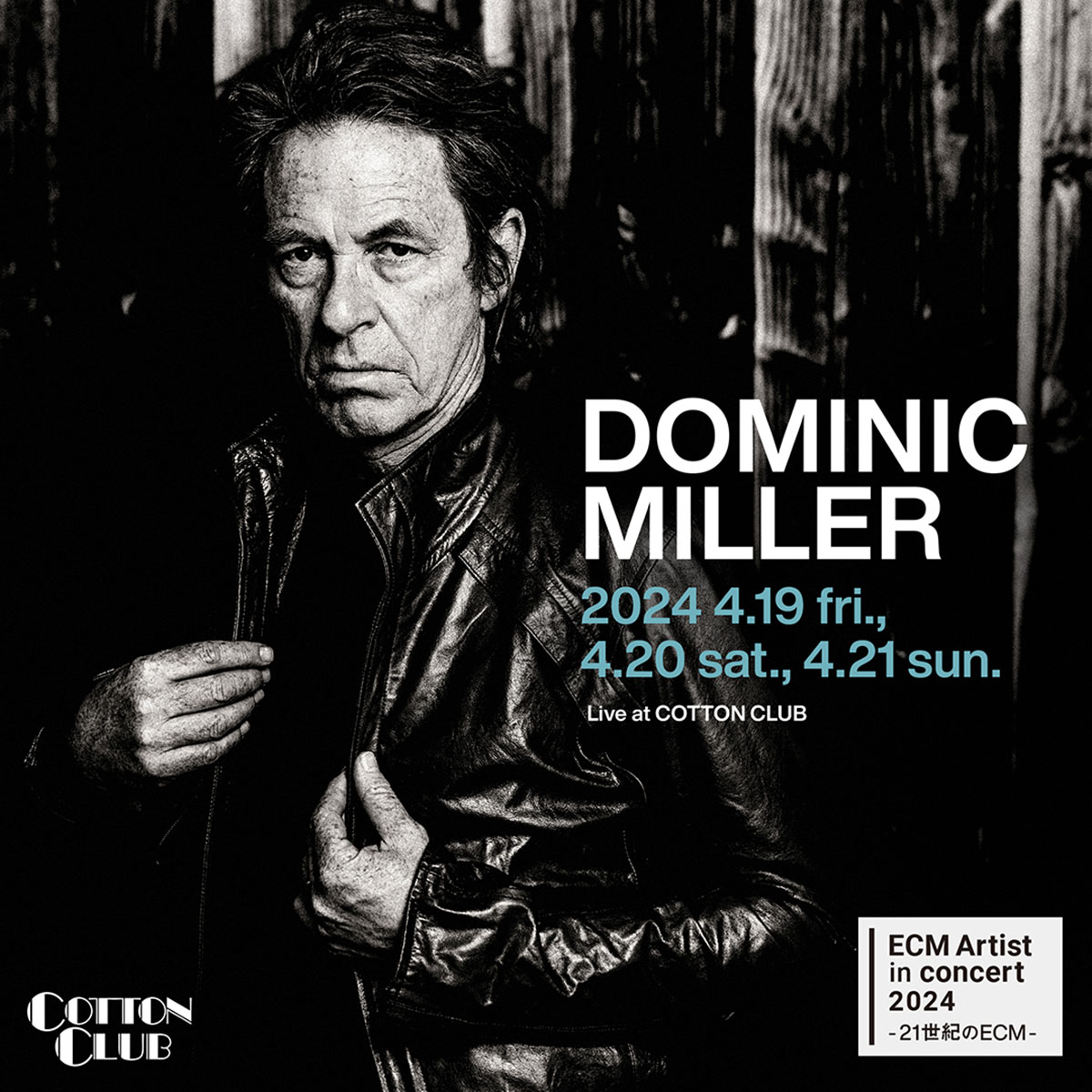Jazz Tokyoについて
このサイトは日本のJazz愛好家、そしてECM Recordsやクラシックのファンもよく見ている、とても真面目な音楽系のサイトです。
というのも、このサイトの管理人・発起人である稲岡邦彌(Kenny Inaoka)さんは、日本のECMマネージャーを長年やってこられた方です。今年、ECM Recordsは創立55周年になりますが、50年前に日本にECMの音楽を紹介して、定着させたのがこの稲岡さんなのです。キース・ジャレットのアルバムは日本で録音されたものも多いですが、それも稲岡さんがいたから出来た事。
つまり彼はECM Recordsの創立者のマンフレート・アイヒャーと共にECMを成長させたアイヒャーのパートナーと言える人です。だからこの「Jazz Tokyo」というサイトは日本のECMのファンが良く読んでいるサイトです。
そんなサイトに私のようなド素人の記事を掲載して頂いたのは本当に畏れ多い事ですし、この素晴らしいサイトにドミニクのインタビューを掲載できることを大変光栄に思います。またこれは日本の皆さんにドミニクのことをもっと知っていただく良い機会になると思っています。
私がインタビューした経緯
しかし、音楽ライターでもミュージシャンでもない素人の私が、ドミニクのようなキャリアの長い世界的に有名なミュージシャンのインタビューを、こんな真面目なサイトに書くのは非常に奇妙な気がします。
なんでそうなったかって言うと、完全に「成り行き」、かつ「時間がなかった」んです(笑)まず最初に私はドミニクの日本のライブの告知をこのサイトにお願いして出してもらいました。
するとサイトの方から「集客するならインタビューがあったほうがいいのでは?」という提案がありました。
だけどそれはもう3月19日ごろで、22日からドミニクはツアーが始まるので、私は聞いてみるけど難しいかもしれないと答えました。だけど、それをドミニクのマネージャーに伝えた所、予想外にも「可能だからやる」と言われたので、慌てて私はその日の夜にドミニクへの質問を考えました。だけどそんな事今までやった事もないし、本当に難しかったです。(しかも英語だし。)
難しかった理由は、この記事で私がJazz Tokyoのためにドミニクに尋ねた質問と、私自身が本当にドミニクに尋ねたい質問とは違うからです。
どういうことかと言うと、この『Jazz Tokyo』で私がドミニクにしている質問の殆どは、「既に私は知っている内容」だからです。私は今までドミニクがインタビューでどんな事をどのように説明しているか、大体内容は把握しているので、そりゃ知ってます。
だけど、『Jazz Tokyo』の読者はドミニクの事を知らない人も一杯いる訳です。残念ながらまだ日本ではドミニクの事は「スティングの横にずっといるロック・ギタリスト」だと思っていて、彼がもうECMから3枚もアルバムを出している事を知らない人も多くいます。
だから、記事や質問の内容は「ドミニク・ミラーという音楽家がどのような考えの元に音楽を作っている人か」と言う事と、「最新作であるアルバム”Vagabond”についての情報をちゃんと伝える」事を意識して質問を考えました。結果的にドミニクの事をあまり知らない読者に対して、彼の事を理解してもらう為に重要なポイントの多くは伝えられたかな、と思っています。
このサイトの質問の中で、私が知らなかった事は、「ドミニクが”Vagabond”の為に25曲を書いた訳ではない」という質問かな?
これはあくまで「曲のアイデアが25個あった」という事でした。
しかし、質問の中で、彼の答えが私のまったく予想外だったのはこれです。
DM: インストゥルメンタル・ミュージックを言葉で説明するのは難しいのですが、私は今回の作曲のプロセス中、私の父がそれぞれの曲に対してどう思うだろうか、どう解釈するだろうかと常に考えていました。
DM: It’s difficult to explain instrumental music but throughout the writing process I was always thinking, what would my father think or read into each piece.
https://jazztokyo.org/interviews/post-98822/
彼がこのアルバムの曲を書いている時に、ずっとこんな事を思っていた、というのは流石に知りませんでした。読んでとても辛かったし、ドミニクのお父さんへの深い愛を強く感じた部分です。
とにかく、読んだ人に少しでもドミニク・ミラーというミュージシャンがどういう考えを持った人なのかという事が伝われば幸いです。
追記 (4.15)
インタビューの内容について少し補足します。
私がドミニクについて一番今回のインタビューで伝えたかった事は、彼は「演奏ではなく曲を聴いてほしい人」である、という事です。それについてドミニクは今回、「私の役割は、楽器の演奏者というよりも作曲家だと思っています。」と語っています。こんなにハッキリ言ったのも初めて見た気がします。
ドミニクはキャリアの初期から中頃まではセッション・ギタリストとしての活動が中心で、フィル・コリンズなどとの仕事もその一つでした。
しかし、彼はスティングと仕事することで、彼の中の作曲能力が大きく開花しました。だからドミニクは以前からどちらかというとギタリストとしてよりも作曲者としての評価がより高い人です。自分でもそう言ってます。実際、彼のスティングの時の演奏聞けばわかると思いますが、ギタリストとして派手な事や目立つ事をやる人とは真逆のタイプなので、どちらかというとギタリストとしては評価や賞賛を得にくいタイプです。彼はあくまでもバンドの中で自分のエゴを捨てて音楽に奉仕するタイプのギタリストで、かなり演奏もシンプルにやります。
そしてスティングはドミニクのそのようなバンドの中でのギタリストとしてのやり方、機能の仕方も勿論高く評価していますが、それ以上にドミニクの作曲能力がとても高いからずっと横に置いているんですね。それをドミニクに期待しています。だからドミニクとスティングは作曲面でお互いに強い影響と刺激を与え合っている存在であり、ドミニクは単純なスティングのサポートギタリストという存在ではありません。
とにかくドミニクは演奏じゃなくて、曲の全体を聴いて曲の中の物語を感じて欲しい人で、メロディが一番大事です。「メロディが王様」なのです。だから曲の構成もわかりやすく簡単でハッキリしていて短い。
彼の今の音楽はJAZZに分類されていますが、どちらかというと真逆の要素が多いと私は思っています。何故ならよく聞くタイプの普通のJAZZはやはり「あのアルバムのあの曲の演奏凄かった」とかの評価をする事が多いと思うんです。ドミニクも「自分の音楽はJazzではないと思う」と言っています。
ドミニクは「すごい演奏だった!」という風には自分にもバンドメンバーにも言われたくないって言ってます。「演奏ですごい!」って言われたくないんですよ。面白いギタリストですよね。だから彼は「演奏者としての役割ではなく作曲者だ」という事なんです。でも、「僕のバンドのメンバーはみんな素晴らしいプレイヤーだから、あなたが彼らの演奏が素晴らしいと思ってくれるなら、それはそれで嬉しいことだよ」と彼は言っています。
そして彼は、たとえば各パートが順番にソロを演奏するような、全体的に長い曲のファンではありません。「正直に言うと自分はJazzのビッグファンじゃないんだ」と言っています。結局そのような曲では演奏部分にフォーカスが当たり、リスナーのメロディや物語の感じ方が弱まってしまうからです。彼は強いメロディーとシンプルな構成で、明確な物語性のある曲を求めているんです。
これがミュージシャン、ドミニク・ミラーの音楽の考え方の核の部分であると言えると思います。
あと、上にも書いた私がドミニクの回答で驚いた部分、(彼が「Vagabond」の作曲中ずっとお父さんがどう思うか考えていたという部分)に私が何故驚いたかというと、私はとあるドミニクと長く共演しているミュージシャンから以前メッセージをもらい、そこには「ドミニクはPrivateな人だ」というコメントがありました。つまり、「あまり自分の心の中を他人に明かさない人」ということです。
ドミニクは普段、マスコミやインタビューの時は、「インストゥルメンタル音楽について言葉で説明はできない」といいつつも、とても一生懸命丁寧に語る人です。結構よく話します。だからそのミュージシャンの言葉は少し以外でもあったんですが、でも彼の繊細な音楽性を考えれば、確かにそれはあくまでメディア向けで、普段の彼はそうなんだとろうな、と納得したところです。なので、そういう事を聞いていたので、この彼の返答はかなり私にとっては「意外な返答」でした。
その事を追記しておきます。
About Jazz Tokyo
This is a serious, slightly specialised music website frequented by Japanese Jazz enthusiasts, as well as fans of ECM Records and classical music.
This is because the website’s administrator and founder, Kuniya Inaoka (Kenny Inaoka), is a long-time ECM manager in Japan.ECM Records celebrates its 55th anniversary this year, but it was Kenny who introduced and established ECM music in Japan 50 years ago.Many of Keith Jarrett’s albums were recorded in Japan, and this was only possible because Kenny was there.
In other words, someone who, together with ECM founder Manfred Eicher, could be called Eicher’s partner in ECM’s growth.That is why Jazz Tokyo is well read by ECM fans in Japan.
So I”m very honoured to be able to publish Dominic’s interview on this wonderful website. I believe it will be a great opportunity for people in Japan to get to know him better.
How I interviewed him.
But it seems very strange that I, a mere fan, amateur and not a music writer, would write an interview with a world-renowned musician with a long career like Dominic’s on such a serious website.
How did that happen? There was no time, so it was just a matter of course (lol).
I first asked if I could put an announcement on this site about Dominic’s gigs in Japan.
Then the website asked me, “Wouldn’t it be better to have an interview if you want to attract customers?” The suggestion was made.
But then it was already 19 March and Dominic was supposed to start his tour on 22 March, so that might not be possible, but I replied that I would ask him just in case. Then when I told this to Dominic’s manager, he unexpectedly said he would do it because it was possible, and in my haste I came up with a question for Dominic that evening. However I’ve never done anything like this before and it was really difficult. (And it’s in English.)
The reason it was difficult is because the questions I asked Dominic for Jazz Tokyo in this article are different from the questions I really wanted to ask him.
In other words, most of the questions I asked Dominic at Jazz Tokyo are ‘things I already know’. I probably know most of what Dominic has said and how he has said it in previous interviews.
But there are a lot of readers of Jazz Tokyo who don’t know about Dominic. Unfortunately, there are still many people in Japan who think of Dominic as just ‘the rock guitarist who has always been next to Sting’ and do not know that he has released three albums on ECM.
I therefore devised a set of questions to help readers better understand Dominic Miller’s musical philosophy and his latest album, Vagabond.As a result, for readers who don’t know much about Dominic, I think I’ve been able to convey many of the key points that are important for them to understand him.
What I didn’t know from the questions on this site is that Dominic did not write 25 songs for Vagabond, it was just the ideas.
But the one thing in the question that his answer was completely unexpected by me was this.
DM: It’s difficult to explain instrumental music but throughout the writing process I was always thinking, what would my father think or read into each piece.
https://jazztokyo.org/interviews/post-98822/
I really didn’t know that he had been thinking about like this all along when he was writing the songs for this album. It was very painful to read and a part of Dominic’s deep love for his father that I felt strongly.
Anyway, whether this is the right interview or not remains to be seen, but hopefully it will give readers some idea of the kind of musician Dominic Miller is.
(Postscript):Terrifyingly, my name, photo and biography are all out there.I will be at the venue during Dominic’s Japan tour, so if you see me, please say hello. But I think I’m a bit different from this photo.
Postscript (15 April)
I would like to add a few details about the interview.
What I wanted to say most about Dominic in this interview was that he is a musician who wants you to listen to his songs, not his performances.On that, Dominic now says: “I see my role as a composer rather than an instrumentalist.” I don’t think I’ve ever seen him say it so clearly before.
Dominic was primarily a session guitarist in his early to mid career, represented by his work with Phil Collins and others.
However, his work with Sting has greatly developed his songwriting abilities within him. So from before, Dominic has had more of a reputation as a songwriter than a guitarist. He has said so himself.
In fact, as you can hear from his work with Sting, he is the type of guitarist who is rather the opposite of doing anything flashy or prominent, so he is the type of guitarist who is a little difficult to get praise and accolades from a lot of people.He is just the type of guitarist who puts his ego aside in the band to serve the music, and he plays quite simply.
And Sting, of course, appreciates Dominic for the way he is as a guitarist and the way he functions in the band, but more than that, Dom’s songwriting ability is so great that he keeps him side. Sting expects that from Dom. In other words, Dominic and Sting are strong influences and inspirations for each other in terms of songwriting, and Dominic is more than just Sting’s backup guitarist.
Anyway, Dominic is someone who wants you to listen to the whole song and feel the story in the song, not the performance, and the melody is the most important thing. He always says “Melody is king”. So the structure of the songs is easy to understand, simple, clear and short.
Although his music is currently classified as jazz, I think it contains many elements that are the opposite of that. Because I think that the type of jazz that you hear a lot is often evaluated by people who say that his performance of that song on that album was great. And also Dominic also states that he does not think his music is Jazz.
He doesn’t want himself or his bandmates to say, “The playing was great!” He doesn’t want people to say that. He’s an interesting guitarist. So he says that his role is that of a composer, not a performer. But he says. ‘Everyone in my band is a great player, so if they feel it’s a great performance, that’s wonderful’.
And for example,he doesn’t songs that are generally long, where each part plays a solo in turn. He says: “To be honest, I’m not a big jazz fan.”Ultimately, such songs focus on the performance part and weaken the listener’s sense of melody and narrative. What he is looking for is a song with a strong melody, a simple structure and a clear narrative. He seeks songs with a clear narrative, with strong melodies and simple structures.
I would say that this is a core part of musician Dominic Miller’s musical thinking.
Lastly, about the part of Dominic’s answer that surprised me (that he was thinking about what his father would think of it the whole time he was composing it).The reason why I was surprised there was that I had received a message earlier from a musician who had played with Dominic for a long time, in which he commented that Dominic is a “Private person”. In other words, “he is someone who does not reveal much of his mind to others”.
Dominic usually tells the press and interviewers that he cannot explain instrumental music in words, yet he explains it very carefully. He talks about it a lot. So the musician’s statement was a little surprising, but given his sensitive musical nature, I think it was only to the media and not normally.I had heard that sort of thing, so this response from him was quite a ‘surprising answer’ to me.
I would like to add that.



